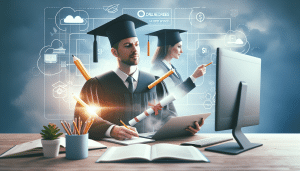Digital Literacy Skills That Shape Your Learning Future
Aiden Foster September 26, 2025
Explore how digital literacy transforms educational experiences and opens new opportunities for students, teachers, and lifelong learners. This guide delves into essential digital skills, their practical uses, challenges, and ways to develop strong digital citizenship within a connected society.
Building a Foundation: What Digital Literacy Means Today
Digital literacy skills are about more than just using a smartphone or laptop. They form the foundation for critical learning, responsible participation, and creativity in society. When individuals develop strong digital competence, they unlock access to vital information, collaboration tools, and opportunities to participate in modern education systems. It’s about knowing how to communicate safely online, evaluate sources reliably, and responsibly share content. These skills allow students and teachers alike to integrate new technologies into daily routines, enabling richer and more interactive learning environments.
The rapid shift toward digital education, including online classes, remote collaboration, and e-learning platforms, underscores the importance of digital literacy in daily life. As schools and universities adapt, digital fluency becomes crucial for both academic achievement and future career readiness. It’s not just about using technology, but also understanding its impact on privacy, security, and ethics in an increasingly interconnected world (Source: https://www.brookings.edu/articles/digital-literacy-for-a-digital-world).
Today, digital literacy encompasses skills that reach beyond basic IT knowledge. It requires the ability to analyze media, recognize bias, and protect oneself from misinformation. Navigating multiple platforms, curating information, and engaging respectfully with diverse viewpoints become essential. Society benefits as individuals grow their digital awareness, fueling informed debate and fostering inclusion in the knowledge economy.
Why Digital Literacy Matters in Modern Education
Education is no longer confined to textbooks and classroom chalkboards. Digital learning tools—ranging from tablets to coding labs—are reshaping school experiences for millions. Teachers use online collaboration platforms for project-based learning, while students develop new forms of literacy through multimedia storytelling and digital research. These advances help students develop critical thinking and adaptability—skills essential for solving complex problems in work and life (Source: https://www.edutopia.org/article/digital-literacy-importance).
Digital literacy also impacts equity in education. With the right training and access, students from different backgrounds learn to use platforms that bridge learning gaps. For example, assistive technologies empower students with disabilities, allowing equitable participation. Effective integration of digital skills ensures no learner is left behind in a world where technology is central to communication, creativity, and future employment prospects.
Beyond academic uses, digital literacy equips students to navigate everyday life. From filling out online forms to accessing public health resources, digital competence smoothens the path to independent living. Increasingly, employers value applicants who demonstrate not only subject knowledge but also digital confidence. Educational institutions are recognizing this shift and embedding digital training in their curricula to prepare students for lifelong success.
Essential Digital Skills and How You Can Develop Them
Mastering digital literacy involves a mix of technical and critical thinking abilities. Fundamental skills start with safe browsing practices and understanding software basics. These form the building blocks for more advanced capabilities such as using productivity suites, managing digital files, and collaborating through cloud-based platforms (Source: https://ec.europa.eu/education/digital-education-action-plan_en).
Coding and computational thinking are increasingly part of digital skill sets. Many schools introduce programming languages early to promote logical thinking, problem-solving, and resilience. Multimedia skills—like video editing, blogging, and podcasting—enable learners to create and share stories in ways that resonate throughout global digital communities. Meanwhile, understanding data privacy and cybersecurity basics remains essential for protecting personal and institutional information online.
Effective approaches to growing these skills include participating in free digital training platforms such as those from major online educators. Public libraries and community centers often offer workshops and resources for learners of all ages. Schools can encourage collaborative projects where students manage wikis, blogs, or even classroom podcasts, applying their digital literacy in practical, hands-on ways. Continuous practice, curiosity, and reliable feedback help nurture digital competence across generations.
Challenges of Digital Inclusion and Bridging the Skills Gap
Despite the growth of technology access, many barriers remain in the path of widespread digital literacy. Reliable internet connectivity, device availability, and teacher training can all impact learners’ opportunities. Some communities struggle with inadequate infrastructure, making it harder for students to join online lessons or access resources beyond classroom walls (Source: https://digitalinclusion.org/).
Other hurdles include affordability and accessibility. Families with limited budgets may prioritize essentials over tech devices, while students with disabilities need tailored solutions to participate fully. There is a growing movement among policymakers and nonprofit organizations to invest in universal broadband, digital toolkit distribution, and inclusive curriculum design to narrow these gaps. These efforts aim to level the playing field for all participants in digital society.
Teacher preparation emerges as a pivotal factor in bridging digital divides. Ongoing professional development in technology use equips educators to support students with varied prior experience. Peer learning communities, where teachers share strategies and resources for digital fluency, have shown promise. By addressing these barriers, society takes steps toward universal digital competence and enables strong participation in evolving knowledge economies.
Digital Citizenship: Practicing Safety and Responsibility Online
As digital platforms become central to communication and learning, developing responsible habits online grows in importance. Digital citizenship is about understanding ethical behavior, safeguarding privacy, and nurturing respectful online communities. Learning to identify cyberbullying, manage digital footprints, and recognize unreliable content helps students and adults use technology with confidence and integrity (Source: https://www.commonsense.org/education/digital-citizenship).
Media literacy is a key part of digital citizenship. With news, advertisements, and social content flowing rapidly through screens, the ability to distinguish fact from fiction is crucial. Misinformation and manipulation tactics can have real-world consequences, so education systems are prioritizing teaching students critical media analysis skills as part of their digital training.
Safe and responsible technology use becomes an ongoing learning process. Families, educators, and peers all play roles in shaping digital etiquette. Open conversations about security settings, consent, and ethical sharing help everyone become more aware. As digital citizenship grows, society benefits from balanced, informed, and compassionate participation in online conversations.
Lifelong Learning: Digital Literacy Beyond Formal Education
Digital literacy doesn’t end with graduation. As new technologies and platforms emerge, lifelong learning becomes necessary to keep skills current. Many adults enroll in continuing education or seek out self-paced courses to expand their digital abilities. This approach helps people adapt to rapidly changing job requirements and participate fully in civic life (Source: https://www.oecd.org/education/2030-project/teaching-and-learning/learning/learning-digital.htm).
Professional development in digital literacy spans sectors—healthcare, business, government, and more. Credible online training programs and micro-credential courses allow individuals to focus on the exact skills required for their work or interests. This flexibility supports economic resilience and encourages innovation across fields.
Community-based programs, open online courses, and cross-generational workshops have also gained popularity. Younger and older learners share perspectives, learning not just tools but also attitudes for adapting to digital change. Cultivating a mindset of curiosity, adaptability, and ethical engagement supports digital literacy as a central life skill for everyone, regardless of age or background.
References
1. Brookings Institution. (n.d.). Digital literacy for a digital world. Retrieved from https://www.brookings.edu/articles/digital-literacy-for-a-digital-world
2. Edutopia. (n.d.). Why digital literacy is so important for today’s students. Retrieved from https://www.edutopia.org/article/digital-literacy-importance
3. European Commission. (n.d.). Digital Education Action Plan. Retrieved from https://ec.europa.eu/education/digital-education-action-plan_en
4. National Digital Inclusion Alliance. (n.d.). What is digital inclusion? Retrieved from https://digitalinclusion.org/
5. Common Sense Education. (n.d.). Digital citizenship curriculum. Retrieved from https://www.commonsense.org/education/digital-citizenship
6. OECD. (n.d.). Lifelong learning in the digital era. Retrieved from https://www.oecd.org/education/2030-project/teaching-and-learning/learning/learning-digital.htm








